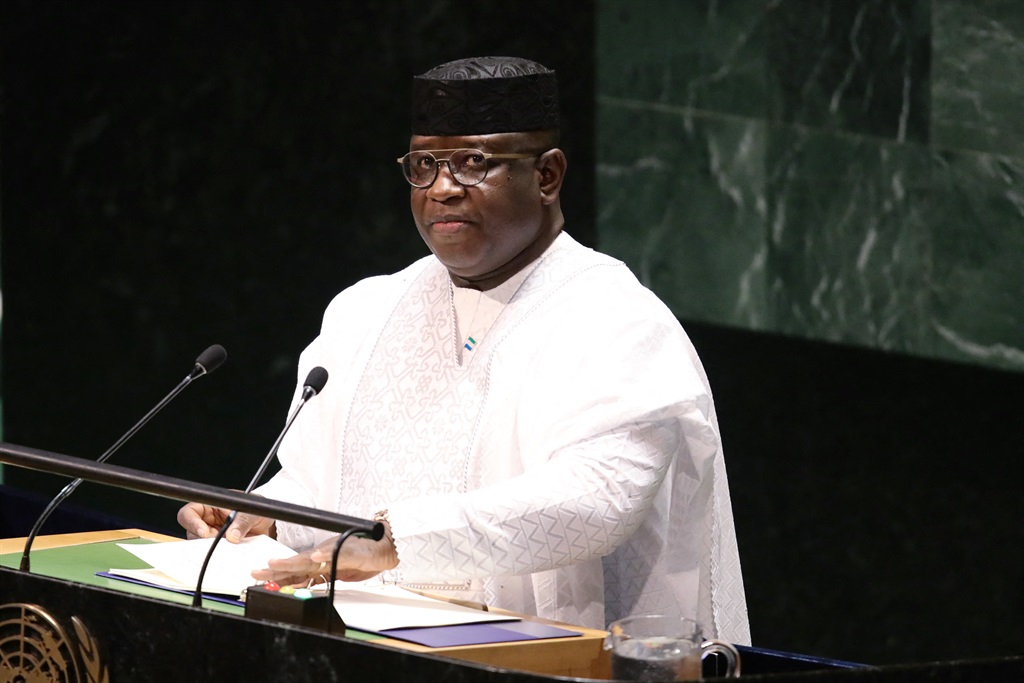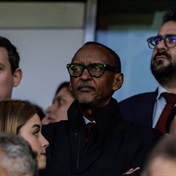
- President Julius Bio was part of the 1992 and 1996 coups in Sierra Leone.
- He survived an attempt on his presidency last year.
- Bio said democracy thrived on engagement, transparency and the rule of law.
Democracy is like "a muscle that requires constant exercise to remain robust and resilient", Sierra Leone's President Julius Maada Bio said at the annual lecture in African Studies at the University of Pennsylvania, in the US, this week.
Bio should know - in November last year, he survived a coup attempt just a few months into his second term.
He has also been on the other side of coups.
Bio said the attempt to topple him had left a dark patch in the country's social fabric.
"In the context of Sierra Leone, recent attempts to subvert democracy have resulted in significant distress, leading to loss of life and causing shock to the very core of our democratic principles.
"These events serve as a stark reminder of the fragility of democracy and the importance of safeguarding it against forces that seek to undermine its integrity," Bio said.
His predecessor, Ernest Bai Koroma, was linked to the putsch.
Koroma is now exiled in Nigeria after the Economic Community of West African States (Ecowas) negotiated for his release.
Bio, after his re-election, with 56.17% of the vote last year, promised electoral reforms.
READ | More children are surviving than ever in history - but not in sub-Saharan Africa
During his lecture, he said, the foundation of democracy was strong institutions.
"Democracy thrives on engagement, transparency and the rule of law - and, like any muscle, if neglected, it risks atrophy, leaving societies vulnerable to the forces of autocracy and despotism," he said.
Sierra Leone has its record in coup books.
Back in 1992, Bio's close friend, Valentine Strasser, an army officer, became the world's youngest head of state three days after his 25th birthday. This was during a civil war - but, after dislodging the late president Joseph Saidu Momoh, the war continued.
Four years later, as a brigadier-general in the army, Bio executed a coup to end Strasser's presidency.
Three months into power, Bio negotiated to end the civil war and return the country to civilian rule, while he went into exile in the United States.
It was against this background that, he said, Sierra Leone's democracy could withstand pressures.
"What is true for Sierra Leone is also true for my journey as a soldier, politician and statesman.
"Emerging from the shadows of colonialism and the ravages of a bloody civil war, Sierra Leone has embarked on a remarkable journey towards a vibrant democracy, breathing life into the freedoms that form the essence of our national identity."
He said:
Bio said he was a democrat because, instead of clinging to power after being directly involved in the 1992 and 1996 coups, he opted for what was right and what he believed in.
"Choosing to relinquish power, especially as a young leader who could have justified holding onto power, was not merely a personal decision, but a declaration of my commitment to democratic governance," he said.
Coups are endemic in West Africa.
Nine were attempted since 2020, with six successes. It poses a question about the effectiveness of Ecowas.
To avoid unrest in his own country, Bio allowed Koroma to go into exile.
He said he was committed to upholding democratic principles in the region.
"These challenges call into question the effectiveness of Ecowas, as a regional body, in its crucial role as a mediator and guardian of democratic principles.
"I remain committed to the difficult and necessary task of making sure that this body becomes more relevant and effective in upholding and strengthening democracy, and call upon fellow leaders to do the same," he said.
Last year, the lecture series was conducted by Botswana's President Mokgweetsi Masisi.
The News24 Africa Desk is supported by the Hanns Seidel Foundation. The stories produced through the Africa Desk and the opinions and statements that may be contained herein do not reflect those of the Hanns Seidel Foundation.




 Publications
Publications
 Partners
Partners
























